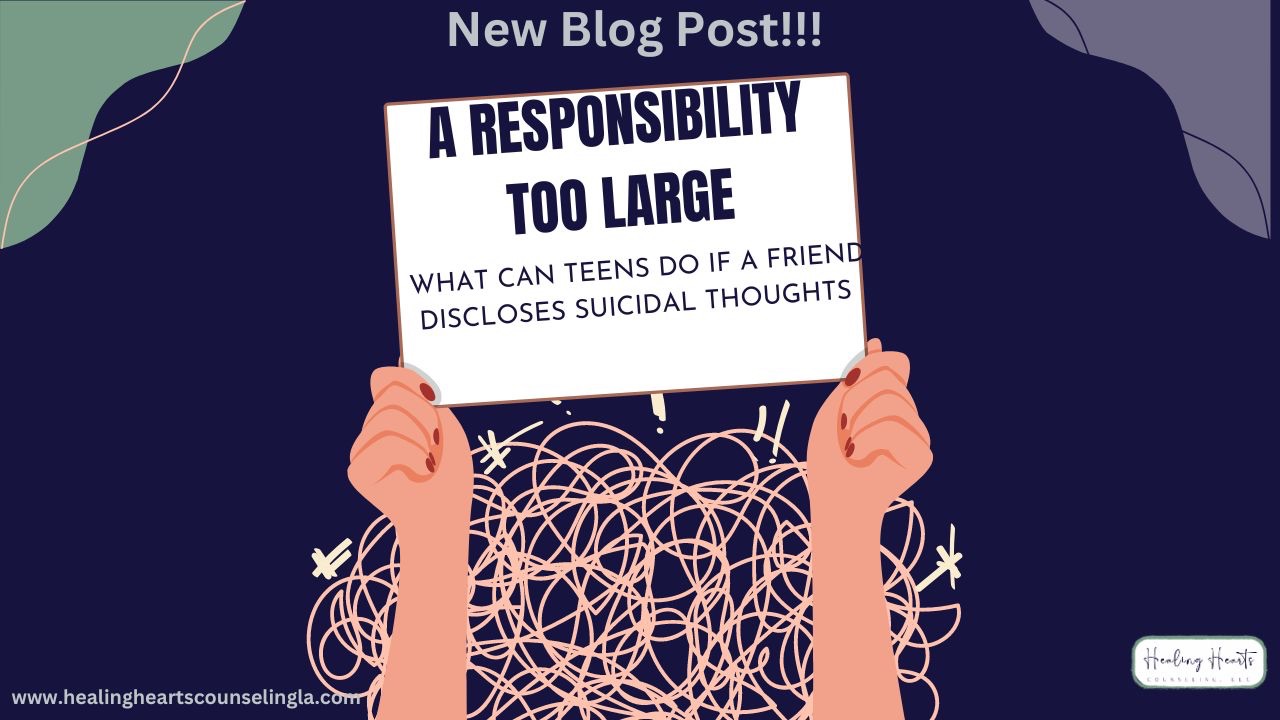A Responsibility Too Large
May 28, 2023
America is in a mental health crisis. According to the CDC, one of the leading causes of death for U.S. teens is suicide!! As a professional counselor to kids, teens, and adults, I’ve seen a trend in teens who are struggling with depression and suicidal thoughts to entrust this solely to another teen. Since the situation is so sensitive, it incites all kinds of insecurities about what to do and how to respond. Breaking a friend’s trust with something so personal doesn’t always feel like an option.
It is though!! I want to be abundantly clear here that a friend’s thoughts of ending their life or even self-harm behavior is not something our teens can just work out among themselves. This information is meant to be shared with a safe adult. (I’m going to change to talking directly to teens—you are welcome to read this article to them).
Teens: You holding this information of your friend’s deep struggles all to yourself is not serving your friend well. I get that there’s this feeling of importance you get when someone trusts you with something so deep. I get that they very well might have asked you not to tell anyone else. I get that other unsafe adults may have contributed to their problem making telling an adult seem like a bad idea. I get that it feels scary to share something like that with an adult, but your friend’s life is worth it.
I love that you are a trustworthy enough friend to be entrusted with that information, but I now encourage you to be a brave and loving friend and share it with someone who can really help them. By choosing to tell another safe adult who can get them the help they need, you may literally be saving their life. Mental illness thrives in secrecy and darkness. You bringing it to light may be the most helpful thing you can do.
Some suggestions include asking your friend if she’d like you to come with her to the guidance counselor to talk about what she just shared, or go to another adult you trust. If your friend is from a safe home, you can start by helping them tell their parent(s). Teachers, coaches, church staff, and other safe adults are also a great start in moving toward getting your friend help and support.
You can literally say something along these lines after the disclosure of sensitive information, “Thanks for trusting me with that and thanks for being brave enough to tell me. Here’s what I know, your life is valuable, and I don’t have the skills to help make sure you can take care of yourself and not harm yourself. There are safe adults who can help you. Do you want me to go with you to tell the guidance counselor, parent, teacher, church leader, etc or do you want me to tell them?” Know you may get some push back here that won’t feel good. Sometimes even when it’s a good thing, people will push against it because it’s uncomfortable. If they choose not to go with you to a safe adult, you can go by yourself to tell a safe adult. As harsh as this sounds, your decision may be between breaking your friend’s trust or feeling the weight of holding that information to yourself if they did actually make an attempt on their life.
It’s worth noting here that a common misconception about suicide is that if we don’t talk about it, it won’t happen. The truth is actually just the opposite. Sensitive, attuned conversation allows for more solutions for suicidal thoughts than creating issues around those thoughts. I’m not saying you have to talk about it all the time, but remember mental illness thrives in secrecy and shame. It’s not hurtful or unkind to follow up with your friend about what they shared. You can ask, in a moment that provides some confidentially (like not in the middle of class in front of other people), “How are you doing with those tough feelings you were experiencing last week?” Just listen. Your job isn’t to solve their problem, just listen. You can empathize and remind them how certain you are of how valuable their life is.
You are not responsible for their life, but you can be a kind friend. If the relationship is moving toward what mental health professional call codependent, you can set a boundary. That might sound something like, “I love you, but I can’t take on the responsibility of making sure you stay alive. I can check on you, and help you find someone who can help you.” Codependecy in short is when a relationship is unequally balanced, and one person takes the responsibility for things that are not theirs to hold like behaviors and emotions. We can’t control other people’s behaviors or emotions, after all.
If you want some ideas of how you can help, here are some… You can pray for your friend, you can check on them, you can send them funny memes (laughter really is good for the soul), you can invite them with you to places that help facilitate connection like youth group or civic organizations, you can encourage them with kind words, and I’m sure you can think of some too. You are a good friend!
Adults: Please communicate this to your teens about taking on the responsibility of holding someone’s secret of suicidal ideation. It is a responsibility too large.
In other news: Did you know I wrote a family devotional with my friend and fellow counselor?! Check it out here: www.theproverbsproject.net

